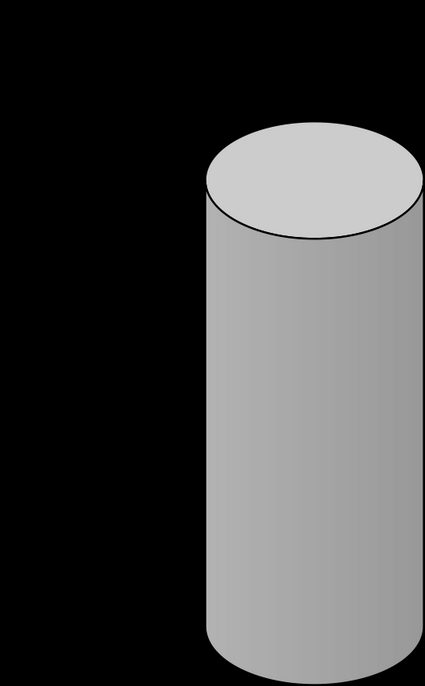Concrete Cylinder Calculator
This concrete cylinder calculator will help you determine how much concrete you will need to fill your cylindrical forms when constructing concrete cylinder columns. This tool also works as a concrete cylinder weight calculator to help you when purchasing concrete, as suppliers may ask for weight instead of volume. Keep on reading to find out:
- How to use this concrete cylinder calculator; and
- How to calculate the concrete volume of cylinder columns.
How to use this volume of a concrete cylinder calculator
Let's say we need to make 10 concrete cylinder specimens for compressive strength testing of a new cement brand, and we decide to use concrete cylinders measuring 4 inches in diameter and 8 inches in height. We want to know if the new cement brand can reach a compressive strength of 2,900 psi using a 1:1.5:3 cement mix ratio. Here are the steps to find out how much concrete we would need for this test using our calculator:
-
Input
4 inchesfor the diameter and8 inchesfor the height. -
Enter
10for the quantity of concrete cylinders needed. Our calculator will already display a concrete volume of1,005.3 cubic inchesby this time. -
Under the Concrete materials needed section of our tool, choose
I'll mix my own concretefor the Concrete mix since we are trying out a new cement mix and would like to mix our own concrete. -
Select
1:1.5:3 (20.0 MPa or 2900 psi)for the Concrete mix ratio for this particular test. -
Lastly, enter a waste percentage to account for any wastage or concrete spillage during the pouring process. Let's say
5%.
After doing these steps, you will see in our concrete cylinder calculator that we need a total volume of 10,55.6 in³ concrete, where we'll need 191.92 in³ of cement, 287.9 in³ of sand, and 575.8 in³ of gravel for our selected concrete mix.
If you know how much each material costs, you can click on the Material costs heading of our calculator to input these values to estimate how much your materials would cost.
On the other hand, what if we want to calculate a concrete cylinder's weight and volume manually? We'll talk about that in the next section of this text.
Volume of a cylinder column and concrete cylinder weight calculation
Let's say our plan specifies the construction of 4 concrete cylinder columns measuring 20 inches in diameter and 9 feet (or 108 inches) in height. We first have to determine the volume of one concrete cylinder using the cylinder volume formula, as shown below:
where:
- – Volume of concrete we need for a single column;
- – Diameter of the column we need to construct; and
- – Height of each column.
We multiply our calculated volume by the number of columns we need to find our required total concrete volume. Now is also the best time to consider a wastage percentage, perhaps 5% again.
where:
- – Total concrete volume needed; and
- – Number or quantity of columns we need to construct.
For the concrete cylinder weight calculation, we need to multiply our calculated volume by the density of concrete we wish to use, say 4,050 lb/yd³, to get:
💡 When constructing concrete cylinders, one neat way of doing them is using readily available tube forms like Sonotubes. You can check our sonotube concrete calculator to learn more about it.
Want to learn more?
If you find this tool interesting and would love to learn more about concrete, here is a list of our other concrete calculators you can check:
What are concrete cylinders used for?
Concrete cylinders have a lot of uses. We can use them as columns, posts, and even as balusters. Other than these uses, we also use concrete cylinders for concrete compressive strength tests. We can also make tiny ones (e.g., 3" in diameter and 3" in height) as concrete spacers to elevate footing reinforcing bars before pouring concrete.
How do I know the volume of a concrete cylinder?
To know how much concrete you need to fill a cylinder mold:
-
Measure the inner diameter and height of your mold.
-
Take the volume of the mold using this equation:
volume = π × diameter² × height / 4. -
Multiply the volume by the concrete's density, typically 150 lb/ft³ (2,400 kg/m³), to find the weight of your required concrete volume.
-
You may want to add at least 5% of your concrete to cover any wasted concrete during the pouring process.
What is the base area of a concrete cylinder?
The base area of a concrete cylinder is equal to its volume divided by its height. Say a concrete cylinder has a volume of 340 cubic inches and a height of 12 inches. Its area will then be 340 in³ / 12 in = 28.33 in².
Consequently, its diameter would be equal to:
√(4 × area / π) = √(4 × 28.33 / π) = 6.005 in ≈ 6 inches.
And its total surface area would be:
(π × diameter × height) + (2 × area) = (π × 6 × 12) + (2 × 28.33) = 282.85 in².
